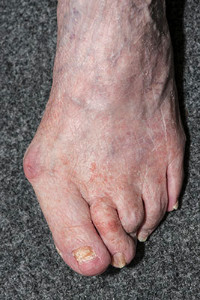
 A bunion is defined as a noticeable, bony bump that extends on the side of the big toe. It can gradually form as a result of wearing shoes that do not have adequate room for the toes to move freely in. Additionally, genetic factors may play a significant role in developing a bunion. Common symptoms that many patients endure often include pain, redness on or around the affected area, and there may be considerable discomfort while walking. Mild relief may be felt when larger shoes are worn that can accommodate the bunion, and it may be beneficial to wear custom made orthotics. If you see the beginning signs of a bunion, it is suggested that you consult with a podiatrist who can help you to determine what the correct treatment method is for you.
A bunion is defined as a noticeable, bony bump that extends on the side of the big toe. It can gradually form as a result of wearing shoes that do not have adequate room for the toes to move freely in. Additionally, genetic factors may play a significant role in developing a bunion. Common symptoms that many patients endure often include pain, redness on or around the affected area, and there may be considerable discomfort while walking. Mild relief may be felt when larger shoes are worn that can accommodate the bunion, and it may be beneficial to wear custom made orthotics. If you see the beginning signs of a bunion, it is suggested that you consult with a podiatrist who can help you to determine what the correct treatment method is for you.
If you are suffering from bunion pain, contact Dr. Robert Hope of Riverside Podiatry. Our doctor can provide the care you need to keep you pain-free and on your feet.
What Is a Bunion?
Bunions are painful bony bumps that usually develop on the inside of the foot at the joint of the big toe. As the deformity increases over time, it may become painful to walk and wear shoes. Women are more likely to exacerbate existing bunions since they often wear tight, narrow shoes that shift their toes together. Bunion pain can be relieved by wearing wider shoes with enough room for the toes.
Causes
Symptoms
In order to diagnose your bunion, your podiatrist may ask about your medical history, symptoms, and general health. Your doctor might also order an x-ray to take a closer look at your feet. Nonsurgical treatment options include orthotics, padding, icing, changes in footwear, and medication. If nonsurgical treatments don’t alleviate your bunion pain, surgery may be necessary.
If you have any questions, please feel free to contact our office located in Tuscaloosa, and Fayette, AL . We offer the newest diagnostic and treatment technologies for all your foot care needs.
Read more about What Are Bunions?